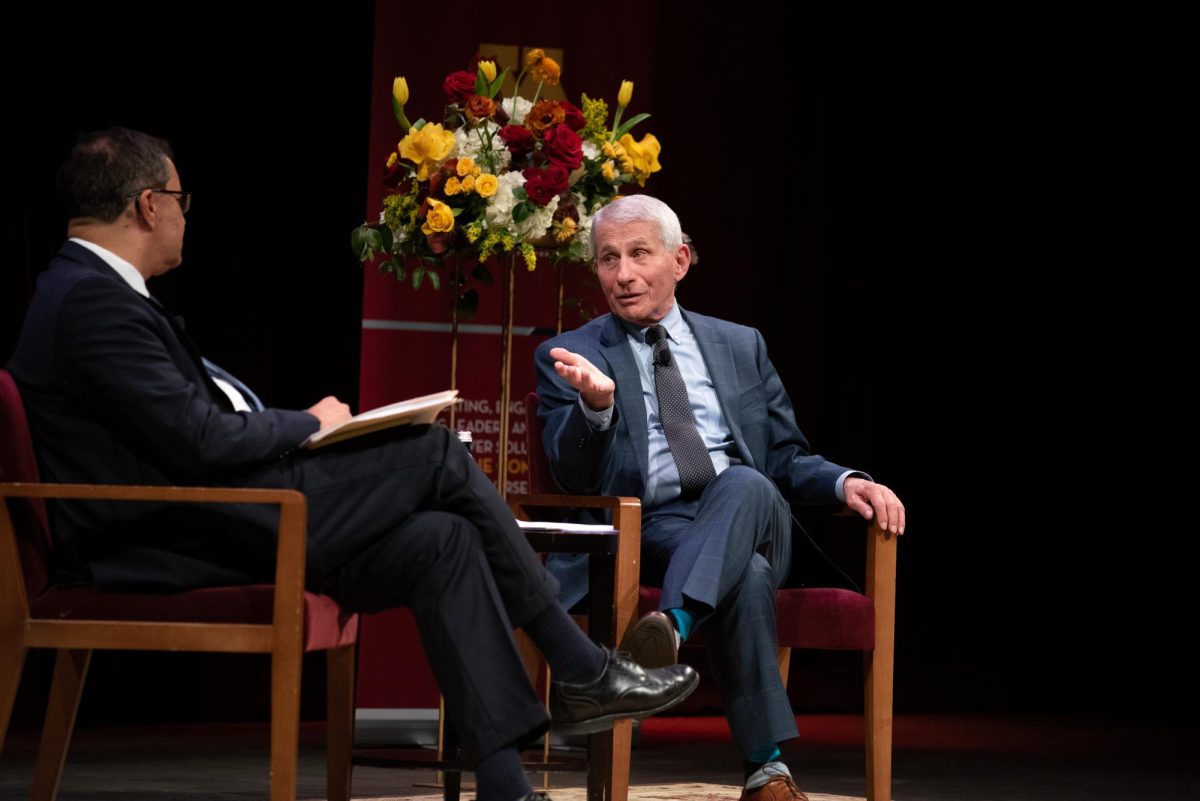
Fauci was joined in conversation with journalist Arshad Mohammed during the lecture. Courtesy of Bruce Wilcox.
Dr. Anthony Fauci detailed his extensive career leading the U.S. through multiple health crises in his role as the director of the National Institute of Allergy and Infectious Diseases and emphasized the importance of trust in science as part of the Distinguished Carlson Lecture Series.
Fauci, the first physician to speak in the lecture series, was originally planned to speak in October. The lecture was canceled due to the occupation of Morrill Hall.
Fauci said that in a tumultuous political climate, the most important thing to do is trust scientific data and to understand that science is not political. Social media and the spread of disinformation have created a general lack of trust in science.
Three people died of measles this year, which is the most measles deaths the country has had in 25 years, Fauci said. This is a direct result of a lack of trust in vaccines, even though the measles vaccine is proven to be 97% effective after two doses.
“At the time, the data clearly showed the shot was effective and people accepted it because there wasn’t a contrary feeling that is now spread by social media,” Fauci said. “So when someone comes in with a conspiracy theory that says measles causes autism when countless studies show it doesn’t, it falls in an echo chamber of people who believe it’s correct.”
Fauci said if Americans continue the trend of not vaccinating themselves or their children, diseases previously eradicated in the U.S., like tuberculosis or HIV/AIDS, could return.
“If we don’t control diseases outside of the United States, they will likely be affecting us here,” Fauci said. “We could have tuberculosis exacerbated or we could have drug-resistant bacteria. We will definitely have a resurgence of HIV if we cut ourselves off from the World Health Organization.”
Fauci said organizations like WHO help the U.S. to stay alert about the current state of diseases like HIV/AIDS.
“It’s for our own benefit to protect us against disease,” Fauci said.
Throughout the lecture, Fauci remained bipartisan and talked about his work with both liberal and conservative administrations. He said scientific data is not political.
“There is no place for politics in public health,” Fauci said.
Fauci developed a foreign aid program in 2003 aiming to end the HIV/AIDS epidemic in Sub-Saharan Africa under George W. Bush’s administration called the United States President’s Emergency Plan for AIDS Relief. The program provides under-developed areas, including southern Africa, with antiviral drugs to prevent the spread of HIV/AIDS.
PEPFAR has saved more than 26 million lives since its creation, according to the United Nations.
During the lecture, Fauci said the main theme throughout his career is to expect the unexpected, as he advised seven presidents about infectious diseases ranging from HIV/AIDS in the 1980s and ‘90s to COVID-19 in 2020.
He also discussed the U.S.’ COVID-19 response and what could have been done to improve it.
Fauci said he and other scientists and government officials could have done a better job explaining how science evolves as new information and discoveries are presented.
“At the time, recommendations were based on the knowledge as we knew it, and the thing we need to express better is that science is a process that gathers information, data and evidence to allow you at a given point to make a recommendation or guideline,” Fauci said. “If you’re dealing with a moving target and the information changes, the process of science is self-correcting.”
Though programs like USAID, Gavi, the Vaccine Alliance and PEPFAR are in danger of being defunded by the Trump administration, Fauci encouraged current university students interested in public health and public service to continue pursuing those careers.
“It is still worth going into this extraordinary field of public health because the ending of your product is not a car or a computer,” Fauci said. “It’s a human life, and that’s the thing to me that is worth sticking it out through the difficult times because this will pass.”
